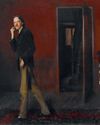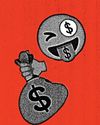
The rabbis of the Talmud taught in parables, fanciful tales meant to illustrate moral principles. To what may a parable be compared? one of them once asked, that being the form of most rabbinical questions. To a cheap candle used by a king to find a gold coin. With just one modest anecdote, you may fathom the Torah!
Jesus taught in parables too—which is not surprising, given that he was also a rabbi of sorts. Why do you speak to the people in parables? his disciples ask him in Matthew 13:10–17, after he has just preached one to large crowds. Because they don’t understand them, he responds, offering one of the most mystifying explanations in the Gospels: Seeing they do not see, and hearing they do not hear. But you disciples, Jesus says, addressing his loyal followers, rank among the initiated and know the mysteries of the kingdom of heaven, so you do understand my parables, and can learn from them: To he who has, more will be given, but from he who has not, more will be taken.
Franz Kafka wasn’t a rabbi, exactly, but he is the high priest of 20th-century literature, and he also wrote in parables. In a brief one called “On Parables,” he asks, in effect, what they’re good for. Why do sages feel obliged to illustrate their principles with tales, requiring their listeners to, as he puts it, “go over” to another world? Kafka answers: The sages don’t mean that we should go to “some actual place,” but rather to “some fabulous yonder, something unknown to us, something too that he cannot designate more precisely, and therefore cannot help us here in the least.” In short, even the sage can’t articulate the meaning of his own parables, and so they’re useless to us. “All these parables really set out to say merely that the incomprehensible is incomprehensible.”
Denne historien er fra July - August 2024-utgaven av The Atlantic.
Start din 7-dagers gratis prøveperiode på Magzter GOLD for å få tilgang til tusenvis av utvalgte premiumhistorier og 9000+ magasiner og aviser.
Allerede abonnent ? Logg på
Denne historien er fra July - August 2024-utgaven av The Atlantic.
Start din 7-dagers gratis prøveperiode på Magzter GOLD for å få tilgang til tusenvis av utvalgte premiumhistorier og 9000+ magasiner og aviser.
Allerede abonnent? Logg på

An Intoxicating 500-Yearold Mystery - The Voynich Manuscript has long baffled scholars-and attracted cranks and conspiracy theorists.
The Voynich Manuscript has long baffled scholars-and attracted cranks and conspiracy theorists. Now a prominent medievalist is taking a new approach to unlocking its secrets.

Pity the Bad Man
A bold new novel invites the reader to consider the plight of the bullies and the boors.

The Wild Adventures of Fanny Stevenson
Her surprising marriage to Robert Louis Stevenson changed literary history.

Does the World Need a Great American Biracial Novel?
The hero of Danzy Senna’ new satire is trying, and failing, to write one.

How Greed Got Good Again
In HBO's Industry, Gen Z reveals itself to be just as moneyobsessed as the corporate raiders of Wall Street.

My Mother the Revolutionary
She cared about saving the world more than she cared about me.

HOW M. NIGHT SHYAMALAN CAME BACK FROM THE DEAD
The filmmaker weathered some of the wildest hype and harshest backlash that Hollywood has to offer. Then he found a different path.

SEVENTY MILES IN THE DARIÉN GAP
The impossible path to America

AMERICAN FURY
For years, experts have warned of a wave of political violence. We should prepare for things to get worse before they get better.

'LORD, HELP US MAKE AMERICA GREAT AGAIN'
A close reading of Trump-rally prayers